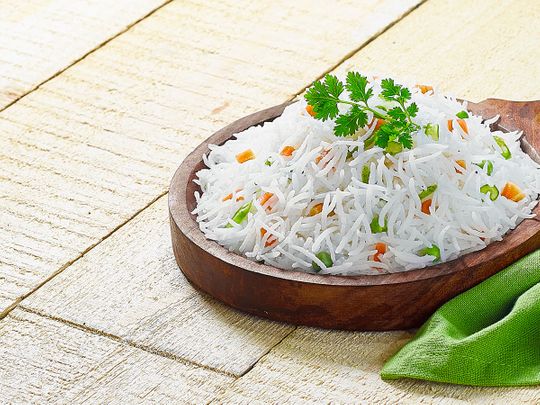
Dubai: There will be no - or minimal - price impact on shoppers in the UAE wanting to pick up Indian basmati rice – but operators of small restaurants and caterers might have to work out some alternate arrangements.
The UAE and wider Gulf markets remain one of the biggest importers of Indian basmati. Other major global suppliers of rice do not have any restrictions on shipments at the moment, traders say.
This comes after India set price limits on basmati rice exports from the country, which has the biggest global share in the category. Under the new terms, India will only allow exports of basmati priced at $1,200 a tonne and over. While India has had an outright ban on wheat exports for some time now, the authorities expanded the ban to non-basmati rice too in July.
And followed that up with the price threshold - $1,200 a tonne – for basmati shipments.
“There are more than enough stocks of basmati available with UAE traders – and that should offset any chance of a price rise immediately,” said Dhananjay Datar, Chairman of Al Adil group, and one of the biggest importers of Indian food items.
“There had been an on and off increases in the price in the recent past. One important thing is since the stock available with us was procured much before the latest restrictions were imposed, it has not resulted in a price hike.”
This is the same feedback other leading food traders and retailers in the UAE have provided. Some said they were taken by surprise by the latest announcement on the price cut-off for basmati exports.

The India decision on basmati exports will not have a direct impact on UAE consumers since most of them buy the premium quality version.
Some F&B businesses will hurt
Market sources say that the biggest change will be for mid- to small restaurants and eateries, as well as caterers. Those using lower priced Indian basmati will have no option but look elsewhere for their requirements. And if prices of these were to go up, it could pinch the businesses.
“These F&B establishments will now source their requirements from traders who provide basmati brought in from other sourcing countries like Pakistan,” said Datar. “We can also bring in rice from suppliers in other countries and that will help traders to circumvent the current situation.”

While we understand the importance of trade decisions, pivoting to new sourcing in a short span is a challenge that retailers need to address
A wait-and-watch situation
Rice traders in the UAE for now are adopting a wait-and-watch approach after India’s recent moves on rice shipments, which include an export duty on parboiled rice.
"Our import costs have risen by 20 per cent,” said Gautam Aggarwal, Managing Director of Dubai-based Gautam General Trading. “If this trend continues, retail prices could match export prices within two months.”
Aggarwal and other importers are considering alternative sources like Thailand and Pakistan. India traditionally supplies around 60 per cent of UAE's rice imports.
According to Aggarwal, the UAE typically imports an average of 15,000 tonnes of rice each month.
Turning to other rice sources presents its own set of challenges. Alrik Rodrigues, Director of Golden Grains Foodstuff Trading, said rice prices have had stability for some time now.
"However, occasional – and unexpected - disruptions do occur,” said Rodrigues. “For instance, we import rice from the US and Vietnam. While the cost of Vietnamese Jasmine rice has risen by less than 10 per cent, rice from the US has more than doubled.”
The US is a prominent global rice producer, particularly of Calrose rice. In 2021, rice production in the US had a total value of slightly over $3 billion. Rodrigues said, "The typical cost of American rice was Dh4.76 per kilogram before 2020, but now stands at Dh8.75 due to heightened local demand and reduced production.
"A mix of factors has resulted in consistently high prices. And it would stay this way for the foreseeable future as the new prices would be set as the benchmark prices."
"The food commodity category is one of the most fast-moving categories in the retail food portfolio," said Marc Laurent at GMG. "There is always a focus by the whole chain of retailers, distributors, and stockers to maintain competitive pricing and availability.
"We have secured alternatives of different basmati origins as the whole market has been focusing on the same, committed not to experience any shortages."








